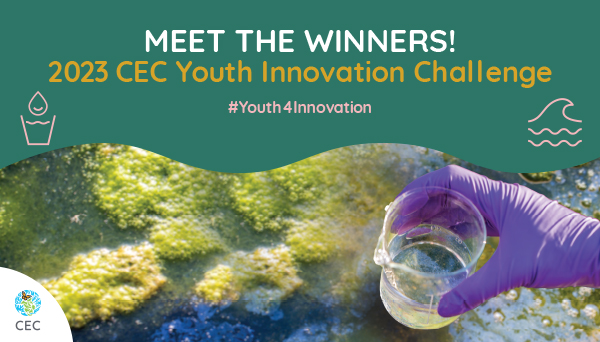North American Youth Innovation Winners Announced: CEC’s 2023 Youth Innovation Challenge
Montreal, 7 June 2023 — The Commission for Environmental Cooperation (CEC) is pleased to announce the winners of the 2023 Youth Innovation Challenge (YIC). This year’s winners were selected for their impactful and innovative solutions to water-related challenges by demonstrating potential benefits for the environment and direct impacts that support communities, with a focus on social, environmental and economic equity.
“We are impressed by the bold and creative submissions from young innovators in Canada, Mexico and the United States. Each submission presented very interesting water-related solutions with a focus on sustainable development and demonstrated the drive and commitment of youth to act and provide solutions to pressing environmental challenges,” said Jorge Daniel Taillant, CEC Executive Director. “The future relies on the initiatives of young eco-entrepreneurs, like the participants in our CEC Youth innovation Challenge. Their passion for the environment and skillful ambition to tackle grave challenges will serve our planet and communities well.”
The 2023 CEC Youth Innovation Challenge winners are:
| WINNERS | SOLUTIONS |
| Canada: Gabrielle Kirk and Michael Lavorato |
Aquaponics: This solution can mimic the natural ecology in a region by creating a symbiotic relationship between plants and aquatic animals, using a closed-loop system to recirculate water through fish tanks and plant beds, conserving water while producing nutrient-rich food and plant fertilizer. |
| Mexico: Arena Serrano Ramos and Annie Rosas Hernández |
BlueBond: Bubbles protecting our water (BlueBond, burbujas que protegen nuestra agua): This solution offers a new way to fight plastic pollution in water bodies in North America. It is designed to prevent plastic waste in water bodies from reaching the oceans through the implementation of an innovative technology and by empowering communities near rivers and coastlines. |
| Mexico: Perseida Tenorio Toledo and y María Guiebeu Ballesteros Ávila |
Water for life mobile school (Escuela itinerante del agua por la vida): This solution creates local change agents in Indigenous and marginalized communities to provide solutions to different water related issues, including lack of access to potable water and contamination of water reserves caused by the absence of drainage systems. |
| United States: Hailey Hall |
Is your water well? This solution is a community-based public health awareness campaign focused on well testing and identifying nitrate pollution. Is your water well? addresses informational and socioeconomic barriers to well testing and targets rural and underserved communities, where wells are often untested or undertested, leaving citizens in these regions vulnerable to the health hazards of nitrate pollution. |
Click here for more information about the 2023 CEC Youth Innovation Challenge winner solutions.
This year’s challenge also supports the ongoing efforts of the United Nations International Decade for Water Action, with a special focus on the connection between water and climate change.
Every year the CEC’s Youth Innovation Challenge invites youth (18-30), who are residents of Canada, Mexico or the United States, to propose environmental solutions to the challenges facing North America. These solutions are then evaluated based on four criteria: impact, innovation, feasibility and replicability, and economic value.
The submissions were evaluated by a panel of North American experts and government representatives and the winners selected will receive up to fifteen thousand (C$15,000) Canadians dollars per country in seed funding. The winners will also have the unique opportunity to present their solution at the 2023 Council Session in Victoria, British Columbia, Canada, benefit from a year-long mentorship opportunity (which includes developing skills in presentation, funding, marketing and networking), and benefit from visibility and communication opportunities that will be developed and disseminated across CEC digital channels and potentially across CEC partners’ channels.
For more information, you can visit the Youth Initiatives section on our website and sign up for our newsletter.
Follow us on Facebook, Twitter, LinkedIn and Instagram and be part of the conversation, using the hashtags #Youth4Innovation and #CEC30.

Winning solutions from Canada, Mexico and the United States focus on ‘Water Solutions for Sustainable Development’ to address the impact of climate change on water, the increasing frequency of droughts, deforestation, forest fires and floods, the release of toxic chemicals to surface waters and other critical issues related to water.
About the CEC
The Commission for Environmental Cooperation (CEC) was established in 1994 by the governments of Canada, Mexico and the United States through the North American Agreement on Environmental Cooperation, a parallel environmental agreement to NAFTA. As of 2020, the CEC is recognized and maintained by the Environmental Cooperation Agreement, in parallel with the new Free Trade Agreement of North America. The CEC brings together a wide range of stakeholders, including the general public, Indigenous people, youth, nongovernmental organizations, academia, and the business sector, to seek solutions to protect North America’s shared environment while supporting sustainable development for the benefit of present and future generations
The CEC is governed and funded equally by the Government of Canada through Environment and Climate Change Canada, the Government of the United States of Mexico through the Secretaría de Medio Ambiente y Recursos Naturales, and the Government of the United States of America through the Environmental Protection Agency.